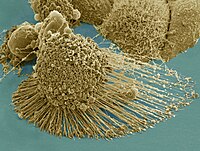
Photo from wikipedia
ABSTRACT Family cancer history (FCH) can shape prevention and early detection behaviors to decrease cancer risk. However, many individuals are unaware of increased risk for cancers based on family patterns.… Click to show full abstract
ABSTRACT Family cancer history (FCH) can shape prevention and early detection behaviors to decrease cancer risk. However, many individuals are unaware of increased risk for cancers based on family patterns. For some African-American communities, communication about FCH is rare and barriers have not been well studied. To optimize the use of FCH, it is crucial to understand how patients gather and share FCH with relatives and healthcare providers. We conducted four focus groups (n = 40) and seven key informant interviews (n = 9) to investigate knowledge, experiences, and barriers/promoters of FCH in the East Baltimore African-American community. Thematic analysis identified 14 distinct themes across six communication domains: participants’ understanding of FCH, past FCH communication with family and providers, barriers to FCH communication, promoters of FCH communication, suggestions for future communication, and community health priorities. FCH was most often defined by narratives of family cancer experiences, and the majority of participants had shared little FCH with family members. Five psychosocial domains were commonly reported as barriers to sharing FCH: fear/denial, pride/dignity, selflessness/self-sacrifice, cancer fatalism, and distrust/skepticism of medical care. Diagnosis/death and caregiving/social support promoted FCH communication and encouraged cancer prevention behaviors such as screening. Although most participants had experienced cancer in their families, communication about FCH was low and psychosocial barriers were common. Understanding these communication domains in minority populations is crucial to developing interventions to address disparities in cancer prevention and control, particularly where effective screening and care recommendations exist for those with positive family histories.
Journal Title: Health Communication
Year Published: 2018
Link to full text (if available)
Share on Social Media: Sign Up to like & get
recommendations!